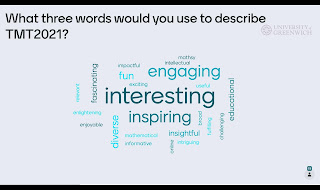Emma Raducanu's feat of winning the US Open as a qualifier, without dropping a set in her ten matches, was astonishing. In feature articles this summer, during and after Wimbledon, her A-level achievements this summer, and especially her A* grade in A-level Mathematics, have been reported, Is there a connection between her tennis accomplishments and her study of maths?
Now, mathematics implicitly arises in tennis tactics. I've discussed toy examples in public lectures on game theory, which (it seems to me) is relevant to choices players make - whether to serve to the forehand or backhand, and where to expect for your opponent to serve, for example. I very much doubt if players ever analyse in these terms, but they are intuitively doing game theory when making their tactical decisions.
But I think in the case of Raducanu there is a more general point. Several times I have heard knowledgeable commentators - most recently Tim Henman immediately after Raducanu's victory over Leylah Fernandez in the US Open final last night - talk about her qualities as a problem solver. She thinks deeply about her tactics, adapting to opponents and match situations. Now problem-solving is a quality which is developed in studying mathematics. (Fernandez, who showed in her victories over three top-five opponents in New York remarkable abilities to turn around matches in which she was behind, apparently enjoys solving Rubik's cube - more mathematical problem-solving!0
Obviously her study of mathematics is not why Raducanu is a great tennis player. But it seems to me that the problem-solving skills which she displays on the tennis court are the same skills which make her good at mathematics.

